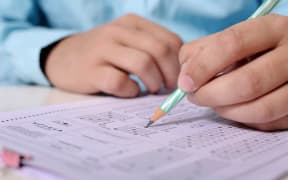
The PISA assessment included surveys of students and principals about background factors in schools, raising issues such as distraction due to digital devices. Photo: 123RF
Phones, hunger and bad teachers were among problems revealed as New Zealand teens' scores dipped further in the PISA tests of reading, writing and maths.
The results published overnight showed average scores for this country's 15 year olds plunged 15 points in maths to 479 points, while their science and reading scores fell 4-5 points to 504 and 501 points respectively.
The figures continued a long-term slump in performance in the Programme for International Student Assessment though New Zealand still ranked in the top 10-11 nations for reading and science and in the middle for maths.
They also came amid an unprecedented drop in performance across many countries which the OECD attributed mostly to Covid-19.
The PISA assessment included surveys of students and principals about background factors in schools.
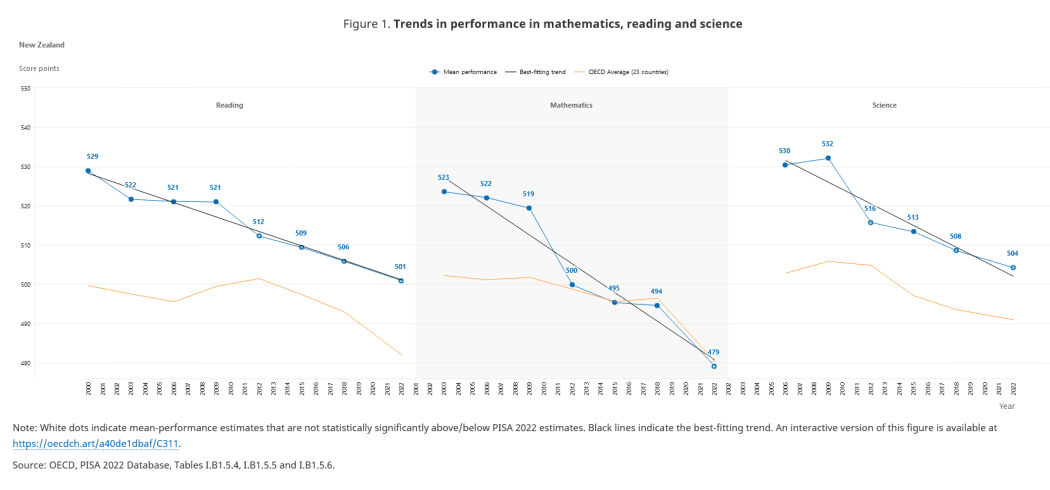
Trends in mathematics, reading and science performance. Note: White dots indicate mean-performance estimates that are not statistically significantly above/below PISA 2022 estimates. Photo: OECD, PISA 2022 Database, Tables I.B1.5.4, I.B1.5.5 and I.B1.5.6.
Bad teachers
A quarter of New Zealand students were in schools where the principals said they had inadequate or poorly qualified teaching staff, up from 16 percent in the previous round of testing in 2018, and nearly half were in schools that struggled to hire teachers.
"In most countries/ economies, students attending schools whose principal reported shortages of teaching staff scored lower in mathematics than students in schools whose principal reported fewer or no shortages of teaching staff," the PISA country report for New Zealand said.
Students were less confident about their ability to solve maths and science problems than they were in the 2012 assessment and maths anxiety had increased with 67 percent worrying they would get poor marks in maths and 40 percent saying they felt helpless when doing a maths problem.
However, students reported higher levels of teacher support in maths than the OECD average.
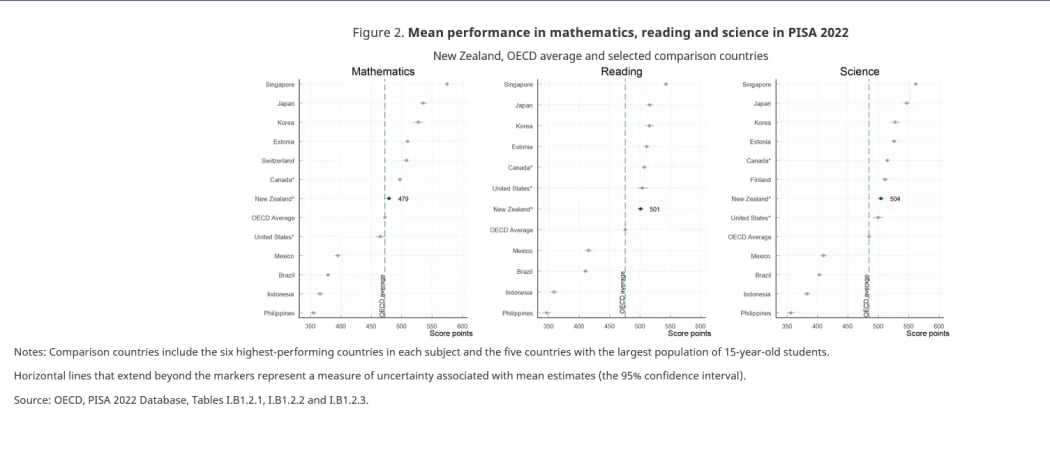
Mean performance in mathematics, reading and science in PISA 2022. Photo: OECD, PISA 2022 Database, Tables I.B1.2.1, I.B1.2.2 and I.B1.2.3.
Covid
The results showed countries that maintained good results had fewer school closures due to Covid than other schools.
Two-thirds of countries closed their schools for longer than three months for a majority of their students during the Covid-19 pandemic. In New Zealand, 42 percent of students reported closures of more than three months due to Covid.
During remote learning, 40 percent of students in New Zealand had problems at least once a week with understanding school assignments and 28 percent had problems finding someone who could help them with schoolwork compared to OECD averages of 34 percent and 24 percent.
Only a third of New Zealand students were motivated to learn during school closures, slightly below the OECD average, but they were more likely to feel supported and ready to learn.
Distractions
The survey found 46 percent of New Zealand students get distracted using digital devices in class (OECD average: 30 percent); and 40 percent get distracted by other students using digital devices (OECD average: 25 percent).
"The amount of time spent on digital devices at school also seems to have an effect. While learning outcomes were often better for students who used digital devices for learning between one to five hours a day than for those who never used them, students who used them more than an hour a day for leisure - social media apps, browsing the internet or games - saw a big drop in maths scores," the report said.
"Interestingly, students in schools with phone bans in some countries were less likely to turn off their notifications from social networks and apps when going to sleep. One explanation is that prohibiting mobiles at schools might lead to students being less capable of adopting responsible behaviour in regard to phone use."
The report said many New Zealand students studied maths in a disciplinary climate that was not favourable to learning.
"In 2022, about 29 percent of students in New Zealand reported that they cannot work well in most or all lessons (OECD average: 23 percent); 41 percent said students do not listen to what the teacher said (OECD average: 30 percent).
However, the report indicated bullying had decreased in New Zealand schools since 2018 with 28 percent saying they experienced bullying in the past month, down from 32 percent in 2018.
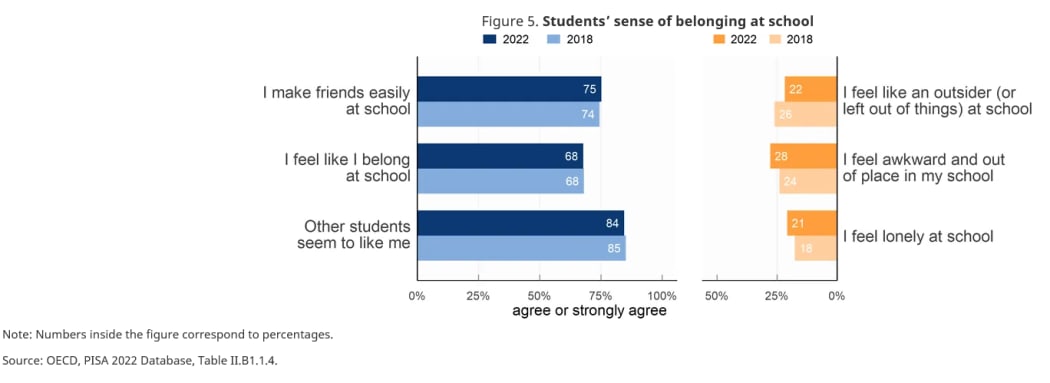
Students' sense of belonging at school. Photo: OECD, PISA 2022 Database, Table II.B1.1.4.
Poverty
New Zealand's results showed the gap between rich and poor students had widened and a relatively high proportion of New Zealand students went hungry each week.
The average score for the richest 25 percent of New Zealand students was 102 points higher than the average for the poorest 25 percent.
That was similar to the OECD average of 93 score points, but an increase from New Zealand's 2018 figure of 87 points.
The report said socio-economic status accounted for 16 percent of the variation in students' maths performance in New Zealand, compared to 15 percent for the OECD average, and 9 percent of disadvantaged New Zealand students scored in the top quarter of maths performance.
It found that 14 percent of New Zealand students reported not eating at least once a week in the past 30 days due to lack of money to buy food, compared to the OECD average of 8 percent.
The report said there was a negative relationship between PISA scores and the percentage of students skipping at least one meal a day.

Mean performance in mathematics, by international quintiles of socio-economic status. Photo: OECD, PISA 2022 Database, Tables I.B1.4.6 and I.B1.4.8.
Attendance
Despite recent attention to poor attendance rates in New Zealand schools, the PISA results showed a weak relationship between attendance and maths scores.
Students classed as chronically absent scored nearly as highly as those with regular attendance.
Moderately absent students scored roughly six score points lower than those with regular attendance.
The Education Ministry said those results showed the sample of students sitting the tests last year was skewed toward higher performers.
Only 72 percent of schools and students participated in the tests, short of the requirement for 85 percent of schools and 80 percent of students and meaning New Zealand's results were likely about 10 points higher than they would have been with a truly representative sample.
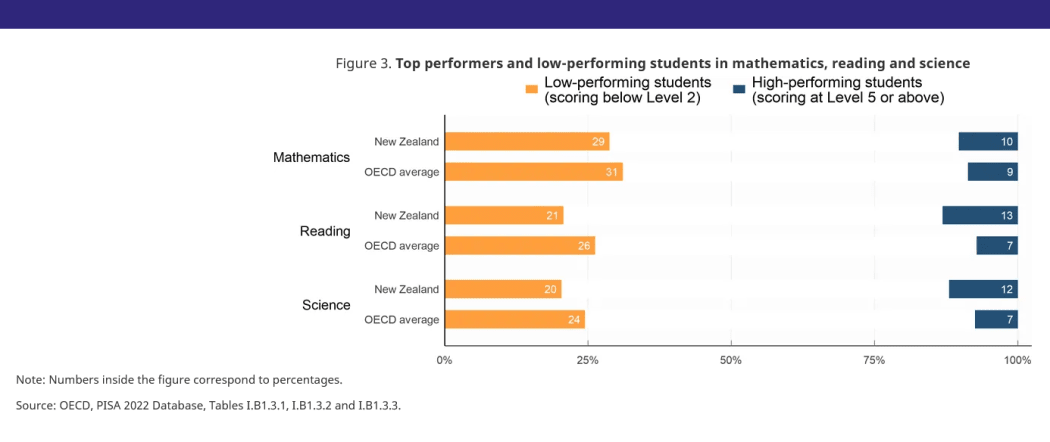
Top performers and low-performing students in mathematics, reading and science. Photo: OECD, PISA 2022 Database, Tables I.B1.3.1, I.B1.3.2 and I.B1.3.3.
PISA tests - the kids don't care
Secondary Principals' Association president Vaughan Couillault said the effects of the pandemic were obvious in the results.
"You notice that there's a global decline in terms of student achievement measured against PISA and that the last couple of years have certainly had an impact. But also there hasn't been much progress in terms of narrowing the socio-economic gap between 'those that have' [who] generally do better and 'those that have not' [who] generally do worse," he said.
Couillault said he had not been expecting an improvement in results because New Zealand students were not motivated to try hard in the assessments.
"This is a test that doesn't get you anything so particularly in the New Zealand setting we have conditioned our students to engage fully where there is a reward and that reward for them is a qualification. There is no reward for doing well in PISA," he said.
Couillault said the failure of several countries including New Zealand, Australia and the United Kingdom to meet the required number of student participants suggested other jurisdictions were struggling to persuade students to sit the tests.
The ongoing decline in PISA scores was worrying but it was time to debate whether it was a valid tool, he said.
The PISA survey of students' school experiences had more value than the actual scores, Couillault said.
New Zealand Initiative researcher Michael Johnston said he was not surprised New Zealand's scores had dropped again because they had been sliding for years.
Dr Johnston said the fact New Zealand had maintained its place in the PISA league tables was no cause for comfort.
"We have to take a long-term view. So when we look back a couple of decades we were the equivalent of probably about a year of schooling better off than we are now, so in other words 15 year olds today in reading and science are performing at about the level we might have expected of a 14-year-old when the testing starting. In maths the drop's a lot bigger, it's more like a year-and-a-half," he said.
New Zealand needed a clearer curriculum and an evidence-based approach to teaching reading and maths, he said.
The worldwide decline in maths and reading scores indicated maths learning in particular suffered when students could not be in a classroom with their teachers, Dr Johnston said.
The Post Primary Teachers' Association said the results showed a widening gap between rich students and poor students.
The union's acting president, Chris Abercrombie, said the assessment system was becoming increasingly irrelevant and last year it was not a priority for many schools.
"Definitely in Aotearoa New Zealand, it was an unnecessarily high-stakes investment for low return for schools," he said.
Education researcher Nina Hood from the University of Auckland and the Education Hub said New Zealand's result was disappointing but not surprising given the disruption caused by the pandemic.
"It just adds to an increasingly worrying picture about declining academic achievement," she said.
Dr Hood said New Zealand's scores had been declining for some time, but especially between 2009 and 2012, and the latest results were consistent with other recent measures of student achievement.
"We can suggest the pandemic has had some impact, but that's not the only thing going on."
Several factors were likely to blame for New Zealand's declining results, Dr Hood said. They included a curriculum change in 2007 that put more emphasis on skills and less on content knowledge, a change in the way maths was taught in primary schools in the 2000s, and increasing use of technology by students both in and out of schools.
She said improving results would require a lot of support for teachers.
One education observer noted that the cohort of 15 year olds who sat the tests would have started school in 2012 and completed their first five years of schooling under the National Standards system for assessing children's achievement and progress in reading, writing and maths.


